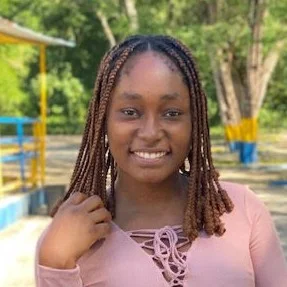In Fall of 2024, the Le Flambeau Foundation awarded the inaugural Dr. Luc L. Colas scholarships to two students in Haiti, attending Université Notre Dame d’Haïti (Cap-Haïtien). Dr. Colas is a founding father of the foundation. These scholarships cover their full college tuition for their final two years of college. Both recipients are pursuing degrees in Agronomy, a field that directly reflects Dr. Colas’ dedication to sustainable development and community empowerment in Haiti. Below are remarks from one of the two scholars, Fanequerlie Pierre, as she moves forward with her second semester of this academic year. She is scheduled to graduate in August 2026.
___________________________

Hello to all,
I hope you are well, by the grace of the Lord. First of all, I would like to thank you for the scholarship you granted me, which has been of great benefit to me. I make no secret of the fact that I am deeply grateful. It is one of the reasons why I devote more time, passion, and dedication to my studies.
To get straight to the point, I will share with you my experience as a Flambeau Foundation scholarship holder at UNDH-Cap. I wouldn’t say that this year has been like any other, as it has been marked by increased motivation and the adoption of stronger principles in my learning. During this semester, I took eight courses, among which I particularly enjoyed industrial culture, applied entomology, and porcine farming.
What I learned most was that Haiti has the potential to develop an industrial culture, provided it has the necessary equipment. With products such as cassava, peanuts, cocoa, sugarcane, corn, and bananas, we could produce many natural products for export.
An important lesson I learned is that Haiti’s well-being could be based on industrial cultivation. We could encourage approximately 70% of the population to engage in the production of natural products such as cassava, coffee, local chocolate, clairin, banana chips, etc., in order to improve the country’s economy. This would be a great initiative, even if we don’t yet have very sophisticated equipment. We could start in an artisanal way, as farmers do, and over time, acquire equipment to progress further.
After obtaining my degree in agronomy, I see my role as that of someone eager to use my knowledge to further the development of my country. Agriculture is the foundation of the Haitian economy, and I see it not only as a field, but also as a mission. I want to help small producers, improve their techniques, introduce more practical technologies on the ground, and support local production so that we can progress without over-reliance on other countries. My role is to serve as a bridge between science and the reality of farming. This isn’t for the sake of title or prestige, but because I believe we can achieve more if we work together.
This experience as a scholarship student has allowed me not only to broaden my knowledge of agronomy but also to strengthen my vision for Haiti’s future. I deeply believe that, through commitment, passion, and the support of organizations like the Le Flambeau Foundation , we can train a generation of young professionals who are aware, capable, and committed to transforming the country. I am determined to be among those who choose to take action, propose concrete solutions, and build a stronger future for our nation through sustainable, modern, and inclusive agriculture.
Fanequerlie Pierre 05/26/25 (translated from French)
To read the update provided by our other Dr. Luc L. Colas scholar, Rodné Trevol, click here.
______________________
### How to Get Involved
There are a number of ways to get involved with the Le Flambeau Foundation . As a supporter, you can donate to the foundation, volunteer your time, or become a mentor to a young person in Haiti. Feel free to contact us by clicking here.
